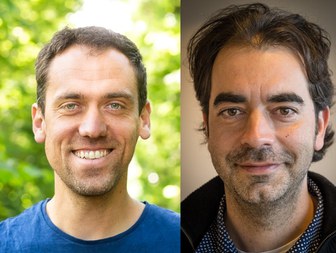Ghent University researchers win ERC Proof of Concept Grant
(05-05-2023) Ghent University researchers Thomas Van Leeuwen (right) and Pieter De Frenne (left) win a Proof of Concept Grant. This allows them to bridge the gap between their groundbreaking research and the early stages of commercialization.
The European Research Council (ERC) has announced 66 new recipients of its Proof of Concept Grant scheme. Worth €150 000 each, their grants will be used to explore the commercial or societal potential of the results of their research projects. The winning projects have been selected out of 122 evaluated proposals. The new grants will be awarded to researchers working in 16 countries. In Belgium, four researchers are awarded, of which two at Ghent University: Thomas Van Leeuwen and Pieter De Frenne.
Discover the winning projects
Efficient genetic transformation of pests and disease vectors
Thomas Van Leeuwen aims to further develop an innovative method for the genetic transformation of difficult to transform arthropod species.
The genome editing technology, CRISPR/Cas9, has revolutionized functional genetic research, offering new tools in numerous scientific disciplines, ranging from human medicine to agriculture. Despite this success, the genome of many organisms remains very hard or even impossible to manipulate. For example, within the Chelicerata, the second largest group of terrestrial animals comprising ticks, mites, scorpions and spiders, genetic engineering was until recently impossible.
During the ERC consolidator grant POLYADAPT, an efficient gene editing system was discovered which allows to genetically transform the spider mite, Tetranychus urticae, a main crop pest, with unprecedented high efficiency. In the proof of concept grant CRISPART, the efficacy of the invention will be demonstrated on a wide range of difficult to transform arthropods. But also the optimal validation trajectory for the invention will be determined.
The availability of efficient genome editing tools will allow to develop more rapidly alternative ways to combat pests and disease vectors that threaten agricultural production and human health.
Microclimate data for everybody
Standard weather stations follow the guidelines of the World Meteorological Organisation that sensors should be installed well away from trees, above short grass. Hence, we know less about how the climate is changing in forests and other remote habitats. This is a problem because the majority of biodiversity across the globe occurs in the shade of trees. Policy makers and land managers urgently need open access to more microclimate data.
Within the MIRRA project, Pieter De Frenne and his colleagues develop an open access instrument with an associated online database. The overarching aim of MIRRA is to develop a simple self-assembly instrument for instantaneous, long-term and remote measurements of microclimate with optimized power usage and data transfer via cellular connectivity. All data become automatically available to everybody online, and MIRRA will thus substantially increase the availability of open access real-time forest microclimate data. As a proof-of-concept showcase, we will install the MIRRA system in forests spread across Europe.
More about the ERC
The ERC, set up by the European Union in 2007, is the premier European funding organisation for excellent frontier research. It funds creative researchers of any nationality and age, to run projects based across Europe. The ERC offers four core grant schemes: Starting Grants, Consolidator Grants, Advanced Grants and Synergy Grants. With its additional Proof of Concept Grant scheme, the ERC helps grantees to bridge the gap between their pioneering research and early phases of its commercialisation.
The ERC is led by an independent governing body, the Scientific Council, whereof VIB-UGent professor Dirk Inzé is a member. Since 1 November 2021, Maria Leptin is the President of the ERC. The overall ERC budget from 2021 to 2027 is more than €16 billion, as part of the Horizon Europe programme, under the responsibility of the European Commissioner for Innovation, Research, Culture, Education and Youth, Mariya Gabriel.
Researchers within and outside of Ghent University who wish to apply for an ERC Grant with our university as host institution, can contact the EU Team for advice and support.
- Read the ERC news item about the Proof of Concept Grants
- More about ERC Grants
- ERC grant holders at Ghent University
Contact
- EU-team UGent, eu-team@ugent.be
- thomas.vanleeuwen@ugent.be
- pieter.defrenne@ugent.be
